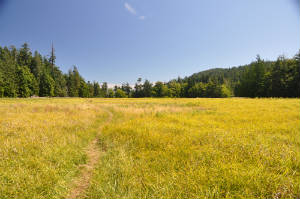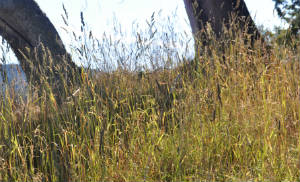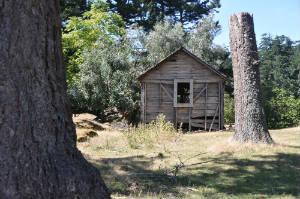Apr

Yokes and Slavery are not just words of a bygone era but a part of all our lives today. Though some yokes are non negotiable many are self inflicted, and if we can not shrug off our yokes we can at least lighten them.
A few years ago I read a story of a prairie pioneer looking for a wife. He did not yet own an ox and so he wanted a strong, broad shouldered woman to wear the yoke of the plow and pull it through the tangled roots and matted grasses of the prairie sod. He actually went looking for a wife in place of an ox! I suppose the wife was cheaper (free) and came with side benefits; she could cook! On a practical level it made sense since it often took more than a few years before the family could afford an ox. Still, it precluded any romantic notions on the part of the prairie sweetheart, unless of course she liked to bench press milk buckets in her spare time. No fancy accomplishments required here, samplers and blue ribbon apple pies excluded. Even when the family could afford to buy an ox to replace the wife in between the shafts, she often had to wear a yoke across her back in order to bring water in from the spring or the well.
Think about this for a minute: the heat of the summer, the insects, the chafing, the sweat and the poor women were more often pregnant than not! The plight of these women comes to mind when I am doing housework, working in the yard, buying groceries, folding laundry or more spiritually when I have a number of commitments or expectations to fulfill. I admit, I can feel sorry for myself, I can feel like I have a burden to bear or a yoke across my shoulders- or worse, I can feel like a slave to my own goodness, my own perfection!
In Galatians 5:1 Paul says:
It is for freedom that Christ has set us free. Stand firm, then, and do not let yourselves be burdened again by a yoke of slavery.
I have read this verse many times and yet recently I stopped and reread it through again and again. I was struck by the revelation that “slavery” and “yoke” were not just words of another era, that we were all afflicted by figurative “yokes” and “slavery” on a regular basis, and that often we were ourselves responsible for these yokes!
The word “yoke” is used in the Bible in 2 contexts. It is a means of harnessing animals to a plow, and secondly it is symbolic of control and servitude. This second context has the most meaning to us. It implies a compromise of will, and a loss of self determination. In the Bible yoke was used in the most negative of circumstances; yoked to Baal (Number 25:3), yoked to Egyptians (Exodus 6:6), and oxen which have never been yoked are chosen for sacrifice (Number 19:2). It was NOT a good thing to be yoked!
Yoked for Work; Slavery
In Chronicles we learn of Jeroboam who was a loyal advisor to Solomon. Unfortunately Solomon developed an interesting hobby; in his old age, he collected wives, 400 of them! He liked variety and his wives came from a number of different religions for which Solomon built temples. Of course God was furious, and promised to take the kingdom away from him, but not in Solomon‘s lifetime out of respect for his father David. David was a good king who remained faithful to God, ( though there was that little, itty bitty problem with adultery and murder…). Jeroboam heard of Solomon’s death and returned from Egypt where he had escaped to avoid Solomon’s heresy and said to Rehoboam:
“Your father put a heavy yoke on us, but now lighten the harsh labor and the heavy yoke he put on us, and we will serve you.”
In this case the “yoke” implied actual, heavy labour. Yokes of different sizes were used for different work depending upon the work to be done. The people had been worked hard, thus heavily yoked. Jeroboam offers the service of the people willingly in exchange for a lighter, less heavy workload; they were happy to serve Rehoboam. Given reasonable expectations they were willing to be servants as opposed to slaves.
No doubt the poor prairie wife felt she had entered a life of slavery. Slavery was a foundation of the ancient epoch. The Hebrews were rescued from Egypt, the land of slavery. In fact Egypt is rarely referred to without the cognomen “land of slavery” added. There was a big difference between the life of Egyptian, Roman, Greek and Hebrew slaves. Most slaves were treated like animals, but the Hebrews kept slaves more in the spirit of servants. Every jubilee year the slaves of a Hebrew could go free, or could pierce their ear with an awl signifying lifetime devotion. Slavery is given another context in Nehemiah 9:17:
They refused to listen and failed to remember the miracles you performed among them. They became stiff-necked and in their rebellion appointed a leader in order to return to their slavery. But you are a forgiving God, gracious and compassionate, slow to anger and abounding in love. Therefore you did not desert them.
Slavery can result from being under the control of a leader. The people appointed their own leader and created their own slavery. God, however, does not want us under the control of anyone but him! Christ died to set us free from the yoke of slavery, he died to set us free from being under the influence or control of anyone but God and if we make ourselves slaves to anyone or anything, if we accept the yoke of anyone or anything other than God, we denigrate his sacrifice.
In Galatians 5:1 the word is used differently.
Paul is referring to the figurative use of the word yoke meaning the Law of God. Paul’s yoke was not bound up in rules and requirements. These rules are all too easily commandeered and distorted as they were by the Pharisees of his time. He is referring to the same yoke that Jesus refers to when he says:
“Come to me, all you who are weary and burdened, and I will give you rest. Take my yoke upon you and learn from me, for I am gentle and humble in heart, and you will find rest for your souls. For my yoke is easy and my burden is light.” Matthew 11:28-30
Jesus offers us his yoke, which is the teaching of God, a much lighter yoke than was the heavy yoke of the current scribal teaching at the time he spoke these words. In Galatians Paul is echoing Jesus; his yoke is also the scribal teaching of the time. This doesn’t mean it cannot refer to us in modern times. Our current times come with a plethora of man made yokes and states of slavery which weigh us all down.
Personal Yokes
The trick is, of course, to recognize our personal “yoke(s) of slavery”. In our “so advanced” society we have far to many to list here! A few are: time, urgency, status, beauty, perfectionism, accomplishment, and pride.We place ourselves under yokes based upon our personality, our jobs, our place in the community and our role in the family. I am a “Homemaker” therefore my job is to run my household smoothly and without fault. My fridge must always be full, dinners must be healthy and tasty and appeal to everyone’s personal preferences, the house must be clean and tidy at all times, every shelf, cupboard, nook and cranny dust free and well organized, and the garden weeded, delightful flowers blooming in all the beds! As you can see one of my other, heavy yokes is one of perfectionism! In my community I need to take food to sick people, cookies to new neighbours, be a forest custodian, pick up garbage, and volunteer at my church. As a Homeschooling Mom I need to be available to my children at all times to work with them in achieving the learning outcomes provided by the “helpful” Ministry of Education, I must take them to all social events to avoid the social isolation so many people think is the fate of homeschooled children (HA!) and I must insure they are registered and arrive at a plethora of extra curricular activities like ballet, soccer, piano, skating, etc. I have many more yokes, some heavy and some light which make up my life. I feel very blessed in my family and friends, my church and community, and most of my heavy yokes are of my own making. Regardless of the nature of my yokes it is important to recognize them for what they are and remember:
It is for freedom that Christ has set us free. Stand firm, then, and do not let yourselves be burdened again by a yoke of slavery.
Ask yourself : What is my yoke, and why am I bearing it? If the answer is that you HAVE to bear the yoke, for example you have to work a job which you dislike but which pays the bills while you study part time, or perhaps you have a life situation which weighs upon you but you cannot change (an elderly parent or disabled child), then is it possible to change your posture towards that yoke and thus make it lighter? If a yoke can be transformed to the extent that it is a joy to bear is it possible for it to NOT be a yoke at all?
Change Of Attitude
I believe it IS possible for a yoke not to be a yoke of slavery and if not a burden at all, at least considerably lighter. But how? The answer is in the words of Jesus, HIS yoke is easy, HIS burden is light! He is offering us service to God (learning the law and obeying it) as opposed to service to man (hard labour, fear and worry) which leaves us weary and burdened. If I can develop a different attitude towards my yokes then they will no longer be the yokes of slavery but of Jesus, light and easy. How does this look? Paul writes in Colossians 3:23:
Whatever you do, work at it with all your heart, as working for the Lord, not for human masters.
It takes a creative mind to switch from a negative to a positive perspective. Here are some suggestions:
View your work as for a new “master”; Jesus.
Exercise gratitude; think of reasons to be grateful for your yoke.
Distraction; listen to an audio-book (my personal preference), or play your favourite tunes. My daughter does housework to wild dance tunes and sings at the top of her lungs!
Reward yourself; chocolate, ice-cream, or a nap.
Find company; I often share a job with a friend, like gardening. We weed her yard and then mine. Many hands make light work!
Sing; if you act as one who is full of joy you will become one who is full of joy, try it!
It is hard and sometimes near impossible to put on a happy face under the burdens which we bear, yet practise the art of the creative mind and at the very least your burdens will get lighter. (There is a moratorium on cleaning toilets though, all of the above except number 5 need to be applied to cleaning toilets!)
Unnecessary Burdens
 However if it is not essential that you bear your burden, then why are you? If you bear a yoke which tells you there is a right way to get things done, and this yoke holds you under a standard of perfectionism then cast it off! If you are bearing yoke of accomplishment which dictates that you can not rest until you have achieved a quota of measurable success then drop it! Take a hard look at what you determine to be essential and you may discover that you have created your own yoke and it is unnecessary. Life as a Christian should be a life of joy, not necessarily pain free or without effort, but a life where the yokes are from Christ, light and easy!
However if it is not essential that you bear your burden, then why are you? If you bear a yoke which tells you there is a right way to get things done, and this yoke holds you under a standard of perfectionism then cast it off! If you are bearing yoke of accomplishment which dictates that you can not rest until you have achieved a quota of measurable success then drop it! Take a hard look at what you determine to be essential and you may discover that you have created your own yoke and it is unnecessary. Life as a Christian should be a life of joy, not necessarily pain free or without effort, but a life where the yokes are from Christ, light and easy!
The Prairie Wife
The story of the Prairie wife I began with deserves an addendum. Most of the time the wife bore the yoke of the plow with a determined spirit. Prairie life was hard work and prairie women were tough. She knew she was pulling that plow with a focus on success and the future. It was back breaking but had the potential to be spirit strengthening. I am grateful that the worst I have to deal with is a vacuum cleaner and a toilet brush! Amen!







There are no comments so far